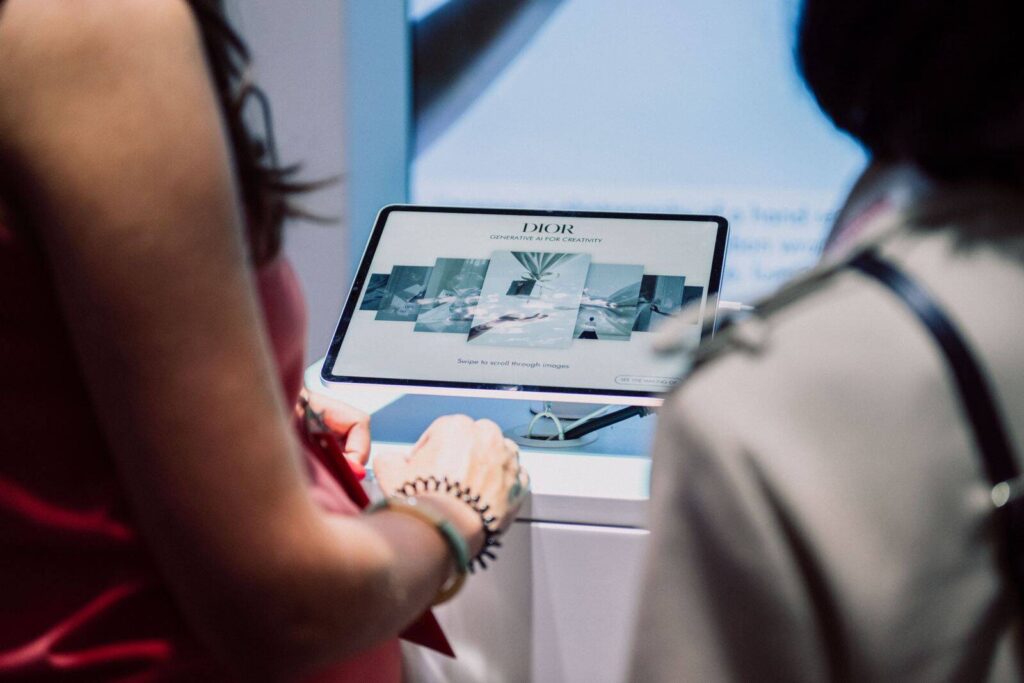Every year, tech stalwarts, luxury moguls, creatives, and innovation-driven startups gather in the halls of Paris' Porte de Versailles to attend the annual VivaTech conference.
Since its inception in 2016, the four-day tech symposium has become one of the most important dates on the luxury calendar, as brands cotton on the value of the emerging digital arena.
This year's edition saw the arrival of big names. With artificial intelligence becoming the buzzword of the week, the likes of Louis Vuitton, Luro Piana, Dior, and Bulgari used the convention as a springboard to pilot their creative AI innovations.
LVMH Group, a founding partner of the VivaTech Summit, wowed attendees with its Dream Garden exhibit, where 13 of the organization's subsidiaries presented their own AI-powered experiences.
Bulgari was one of them. The Italian maison unveiled a first-of-its-kind mixology experience, inviting guests to take the reins of product production and create their own unique scent through interactive technology and AI.
French perfumer Guerlain took a similar approach. The brand leveraged virtual reality tech to create a multidimensional olfactory landscape for visitors, complete with scents, audiovisual capabilities and 3D technology. Users accessed the experience through a headset.
Speaking of which, Apple's new Vision Pro gadget also made an appearance as part of Rimova's immersive offering. Given the headset's recent e-commerce success, audiences can explore Rimova's range of travel products using spatial computing and augmented reality.
Meanwhile, Loro Piana Introducing its “Silhouette” activation. The interactive display enables users to design their own digital doppelgangers before styling them in virtual Loro Piana garments. This is a solution that can be implemented both in-store and online as a new service before you buy.
Others abandoned customer-facing projects in favor of internal solutions.
For example, Dior has deployed generative AI with its new platform, Astra. The tool can reportedly mine data to help keep brands tightly aligned with consumer preferences. This includes customer comments from multiple channels, such as Google reviews, product pages, interactions with customer service, satisfaction surveys, and live shopping sessions.
LVMH has established itself as a notable disruptor in the Web3 ecosystem. In recent years, the group has incorporated many of its Masons into the virtual domain, with the most well-documented being Louis Vuitton's high-octane NFT community.
The congregation's presence at the VivaTech pavilion is helping to generate buzz around Web3.
Previous hurdles have included persuading the fashion community to engage with emerging technologies such as virtual reality, 3D try-on, and AI. But getting endorsements from luxury's biggest linchpin is helping to bridge the gap between the mature landscape and the fashion set.
- In other news this week, L'Occitane en Provence has teamed up with developer Emperia to launch a new virtual shopping destination. L'Occitane Greenhouse invites visitors to discover the brand's range of summer fragrances inspired by the picturesque landscape of southern France. Customers can learn more about L'Occitane's approach to craftsmanship and locally sourced ingredients.
- Digital fashion house Syky has announced a new collaboration with virtual jewelery specialist Xtended Identity. Dropping on June 7, the five-piece collection consists of both digital and physical pieces, including a crafted crown that takes 30 days to create. The collaboration is also the first drop in the “Syky Drops” series, a monthly release of pieces from the world's most exciting digital designers. This week, Xtended Identity also launched its new Vision Pro experience, which offers a new way for consumers to explore the brand's product range.
